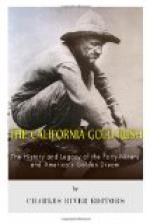The great day of days in a mining-camp was Sunday. Some over-enthusiastic fortune-seekers worked the diggings also on that day; but by general consent—uninfluenced, it may be remarked, by religious considerations—the miners repaired to their little town for amusement and relaxation. These little towns were almost all alike. There were usually two or three combined hotels, saloons, and gambling-houses, built of logs, of slabs, of canvas, or of a combination of the three. There was one store that dispensed whiskey as well as dryer goods, and one or two large places of amusement. On Sunday everything went full blast. The streets were crowded with men; the saloons were well patronized; the gambling games ran all day and late into the night. Wrestling-matches, jumping-matches, other athletic tests, horse-races, lotteries, fortune-telling, singing, anything to get a pinch or two of the dust out of the good-natured miners—all these were going strong. The American, English, and other continentals mingled freely, with the exception of the French, who kept to themselves. Successful Germans or Hollanders of the more stupid class ran so true to type and were so numerous that they earned the generic name of “Dutch Charley.” They have been described as moon-faced, bland, bullet-headed men, with walrus moustaches, and fatuous, placid smiles. Value meant nothing to them. They only knew the difference between having money and having no money. They carried two or three gold watches at the end of long home-made chains of gold nuggets fastened together with links of copper wire. The chains were sometimes looped about their necks, their shoulders, and waists, and even hung down in long festoons. When two or three such Dutch Charleys inhabited one camp, they became deadly rivals in this childlike display, parading slowly up and down the street, casting malevolent glances at each other as they passed. Shoals of phrenologists, fortune-tellers, and the like, generally drunken old reprobates on their last legs, plied their trades. One artist, giving out under the physical labor of mining, built up a remarkably profitable trade in sketching portraits. Incidentally he had to pay two dollars and a half for every piece of paper! John Kelly, a wandering minstrel with a violin, became celebrated among the camps, and was greeted with enthusiasm wherever he appeared. He probably made more with his fiddle than he could have made with his shovel. The influence of the “forty-two caliber whiskey” was dire, and towards the end of Sunday the sports became pretty rough.
This day was also considered the time for the trial of any cases that had arisen during the week. The miners elected one of their number to act as presiding judge in a “miners’ meeting.” Justice was dealt out by this man, either on his own authority with the approval of the crowd, or by popular vote. Disputes about property were adjudicated as well as offenses against the criminal code.




